Films like Jism, Murder and Gangster bear testimony to the fact that Mahesh Bhatt and his banner have been instrumental in backing new talent. Now, Pooja Bhatt launches yet another new face -- Muzzamil Ibrahim -- in the socially relevant Dhokha, releasing August 31.
Pooja and Muzzamil's 'war' during the making of the film has made headlines, with both stars claiming that they've been wronged.
Never one to mince words, Pooja gets candid in a tête-à-tête with Swati R Chaudhary.
Your latest film Dhokha delves deeply into the nature of terrorism.
Dhokha is an audacious attempt that deals with the issues that this country has no options but to wake up to, and acknowledge. There are far too many things going wrong which need to be rectified.
Ever since I became an actor, I don't remember any protagonist voicing a moderate Muslim. I guess the most appealing Muslim character was that of Rishi Kapoor in Amar Akbar Anthony. The face of terror has changed. Dhokha is a film devoid of any political bias. It conveys to the government that when we talk about individuals who are terrorists, we have to first acknowledge that we created them.
You create a terrorist because you mete out injustice in the name of justice. You do not give them their due. At the time of Partition, you promised them that there will be no bias on the basis of religion but the reality is something else.
We've done a lot of research for this film. If you go to Kashmir or Maharashtra or any state for that matter, there is a gross amount of human right violations and they are being conducted against the minority, whether it's Muslims, Dalits or even women. A huge number of crimes go unreported. We had a buffet of delightful crimes to choose from, and to root our characters' angst!
It appears to be pro-Muslim?
Dhokha looks at the issue from a Muslim perspective. But some could even say it is anti-Muslim. We have a Muslim character (Tulip Joshi, who plays a suicide bomber), who goes and blows herself up because she believes that injustice has been committed and she's doing the right thing. She feels she is going to Allah and that nobody should mourn her death.
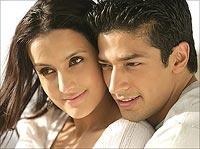 The man she is married to is also a Muslim (Muzzamil Ibrahim). He, on the other hand, feels that you don't have the right to blow yourself up, irrespective of the amount of injustice meted out.
The man she is married to is also a Muslim (Muzzamil Ibrahim). He, on the other hand, feels that you don't have the right to blow yourself up, irrespective of the amount of injustice meted out.
So you have two distinctly opposite points of view within the same community. People assume that when you're talking about a Muslim, you're talking about a man with a long beard and topi who is insane about do's and don'ts. But at the same time, there is a moderate Muslim voice who is tired of being marginalised, tired of saying that every time there is a terror attack the entire community is to blame, and has to apologise.
The film presents two unique perspectives and allows you to come to conclusions. At no point are we absolving the person of their crime. We are just helping you understand why someone does what they do. At no point are we saying that it's okay to do what they do.
What made you take up this sensitive issue?
Dhokha is a conscious attempt to go back to my roots. I had two choices (Daddy and Sadak) when I started off. But I chose a film like Daddy as my launch because I thought it was important for people to first take me seriously as an actor and then attain stardom. So Dhokha is an attempt to go back to doing the kind of cinema that I have always derived a certain amount of satisfaction from.
It's important for me that anything I lend my stamp to must have a perspective that is uniquely mine. The story could work or fail but it must have that perspective. For me, movie-making is more than making a 'hit' film. It's about working with a team of people I really respect and doing something that gives me satisfaction.
When I began my career (as a producer) at the age of 24, I chose Tamanna. So my concerns have been in that world.
Do you think people wish to revisit terror after what transpired on July 11, 2006?
My job is to make a film my way and present it to the world. It is up to them to reject or accept it. If you analyse every pros and cons, you will never be a filmmaker. It takes guts to be able to go out there and dream. It's very easy to write about someone else's dreams but do you have the guts to go out there and dream?
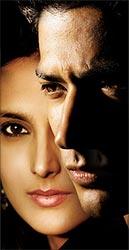 Besides, you have not seen Dhokha's perspective. The only Hindi film that dealt with this subject was Mani Ratnam's Dil Se but that again traces the journey of a suicide bomber from the north-east. Santosh Sivan's The Terrorist is again a fine example of filmmaking. It is more a labour of love than a film made to appeal to commercial sensibilities.
Besides, you have not seen Dhokha's perspective. The only Hindi film that dealt with this subject was Mani Ratnam's Dil Se but that again traces the journey of a suicide bomber from the north-east. Santosh Sivan's The Terrorist is again a fine example of filmmaking. It is more a labour of love than a film made to appeal to commercial sensibilities.
My point is simple.You can't look away from what's happening. It's important to connect and engage ourselves to problems that really affect us as individuals, if we wish to live in a world that we can safely breathe in.
Which is your favourite scene in Dhokha?
The scene where we revisit Sarah's (Tulip Joshi) past and discover what was it that made her a terrorist. It's a heart-wrenching scene that involves Ashutosh Rana, Tulip and Anupam Kher. It is a scene where you can see how heinous human beings can be. It required Tulip to allow herself to be humiliated to the extent that the audience would be able to identify with that humiliation. It was a tricky one to achieve.
I also loved the entire portion of the Devigarh Fort Palace (Udaipur). It was a beautiful location where I had to shoot a traditional nikaah.
Then there is the scene between the hero and the man who represents the so-called jihadi movement. The best line in the film is when the jihadi leader tells the hero that if you say our hands are stained with blood then your hands are not exactly washed clean with milk.
Just like Paap, you're releasing Dhokha in Pakistan as well. How do you think it will be received?
Paap was not released in Pakistan. When I took Paap to Karachi, there was a ban on Hindi Films. We were not allowed to release it. I was the first filmmaker to go there and premiere my film at a film festival. The work that my father and I started doing four years ago by going there every year with a print has now resulted in doors being opened up for films like Awarapan. Pakistan has given Awarapan a new lease of life by making it a superhit.
My relationship with Pakistan is not about revenue. It is to make people realise that we genuinely want this body of work to reach them.
Dhokha will go there as an official entry for the Kara Film Festival (Karachi). I made the movie for Mukesh Bhatt so economically that even if it runs for a week in Mumbai it will make money.
Apparently, Muzzamil and you have sworn to never work with each other again?
It's an unwritten rule that you respect people who've given you breaks. You see somebody's body of work before you take a tone with them. I will talk differently to someone with 18 years of experience and someone with 18 months.
No one has the right to tell somebody how to run their set. Muzzamil is just starting his career. He doesn't understand the norms of the film industry. So he'll learn. I have launched him and it's easy for me to attack him. But when a child you taught to walk is going to behave badly with you, you don't attack that child, you just let them be.
My job is to launch you, present you in the best way possible and just let you be. But I can give it to you in writing that Muzzamil will never get a role like Dhokha again. It's a fantastic author-backed role.
Didn't he deliver as per your expectations?
It's my job to make actors deliver. If you look at my record of the last nine films, people have won National Awards for my movies. My actors never look the same or come across the same way in other films.
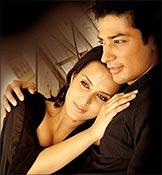 Have you seen Udita (Goswami) or Bipasha (Basu) or John (Abraham) look the same in their other films? Irrfan Khan was cast by us as the main hero (Rog) much before he was even considered to be a leading man. We know how to get performances right and we pride ourselves on that.
Have you seen Udita (Goswami) or Bipasha (Basu) or John (Abraham) look the same in their other films? Irrfan Khan was cast by us as the main hero (Rog) much before he was even considered to be a leading man. We know how to get performances right and we pride ourselves on that.
And when you're investing three and half a crore of your own money and accepting responsibility for everything good or bad in the film, people have to deliver the way you want.
How did you zero in on Tulip for the film?
I thought she was the right choice for the film. My instinct has paid off.
You haven't worked with established stars. You have always roped in newcomers like John Abraham, Udita Goswami, Onjolee Nair (Holiday) and now Muzzamil.
As a producer, I've worked with Ajay Devgan, Kajol, Paresh Rawal and Sanjay Dutt but a film like Holiday didn't require a Madhuri Dixit. It required a young, gawky girl. I couldn't cast an established star for this role.
Besides, we believe in promoting new talent and we have the audacity to do it. It's a lot more work. But I have the energy to spend 40 days on rehearsals. Other filmmakers don't have the energy to spend that much time to groom people.
Not just that, the amount of technicians we launch in every film is staggering. Paap was my cameraman's first film. The man who shot Jism was his first, then the dialogue writers, music directors, lyricists etc.
Would you repeat John, Udita or Irrfan Khan in any of your films again?
I don't repeat people unless I have a better role for them. I haven't worked with Bipasha again, not because I don't want to, but because I don't have a better role than Jism to offer her.
In hindsight, what do you feel about Jism, Paap and Holiday?
Jism was my first commercial hit. But believe me, it was not designed to be. Noir films were not 'in' in Bollywood then, and people said that we had lost our mind. They said you're making a film about a woman who accepts that she is bad and is not apologetic about it.
Jism was the best or the worst thing that could've happened to me because suddenly the market felt that Pooja has made a hit film so now let's repeat that success. They offered us more money to make a movie like Paap and we somewhere fell into that trap.
In retrospect, I feel Paap was a beautifully shot movie. Holiday was far more courageous and mature.
Unfortunately, I cannot separate my personal ideologies from the movies I make. If I could, I would've been very rich like my uncle (Mukesh Bhatt). When my uncle and my dad (Mahesh Bhatt) make a film they make a Murder, but when Pooja Bhatt makes a film she makes a Jism.
There is a difference between the two. In Murder, the heroine -- even though she has an affair -- says that her body is only for her husband. So she is a regressive doormat and that sells more tickets. In Jism, the actress says the body does not know any love and that's radical.
List out a few recent films that you have thoroughly enjoyed?
I enjoyed Life in a... Metro very much. It was a nice slice of life film replete with lovely moments. I also enjoyed Omkara. I think it is one of Saif Ali Khan's finest performances till date. I liked Fanaa, I am a very big Aamir Khan and Kajol fan.
And one film that you disliked?
I didn't particularly care for Jhoom Barabar Jhoom. I was disappointed given the banner, scale and actors involved.
When do we see you onscreen again?
I don't know. I am not really planning a comeback but if something interesting comes up I'll be more than ready to do it.
What's next?
I am starting an interesting, socially relevant film Mushkil in three months time and I am casting a new guy for the same. It is more in the Jism genre than Dhokha. I am producing it and am launching a very young, bright assistant of mine, Sagar, as the director.



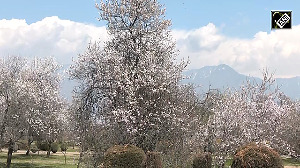

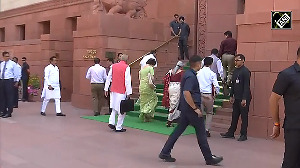
 © 2025
© 2025